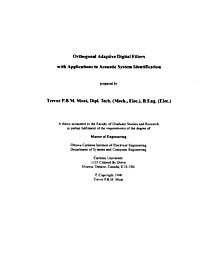
Orthogonal Adaptive Digital Filters with Applications to Acoustic System Identification
The Transform-Domain LMS Algorithm (Narayan, 1983) is studied in the context of an acoustic system identification problem. The power estimator in this two-stage digital filter is shown to affect the achievable rates and depths of convergence significantly. Preferred values for the two tracking parameters, $\beta$ and $\mu,$ are determined. Dynamic Step-size Initialization is proposed to improve early convergence by accelerating the rate at which true power measurements replace (arbitrary) initial values. Later, linear estimators are shown to be sub-optimal, particularly where the spectral distribution of the reference changes rapidly. A simple non-linear Peak Window Power Estimator which eliminates these problems is described. It will be shown to improve the tracking rates and misadjustment simultaneously. The benefits of these methods are demonstrated using FIR sequences representative of typical acoustic environments and using recordings from a commercial telephone set. The proposed structures surpass theexisting algorithms consistently under all circumstances tested.


















